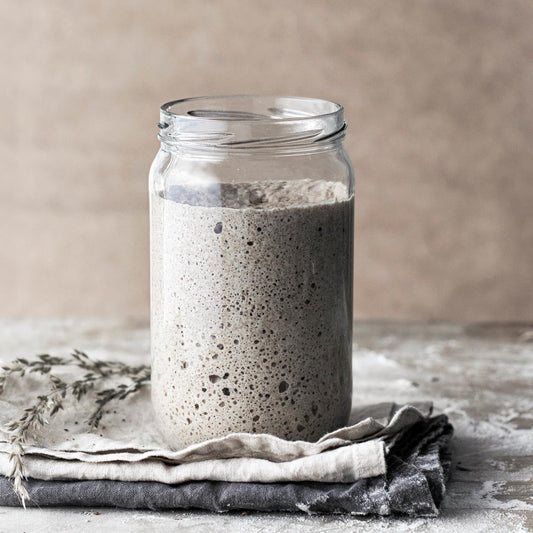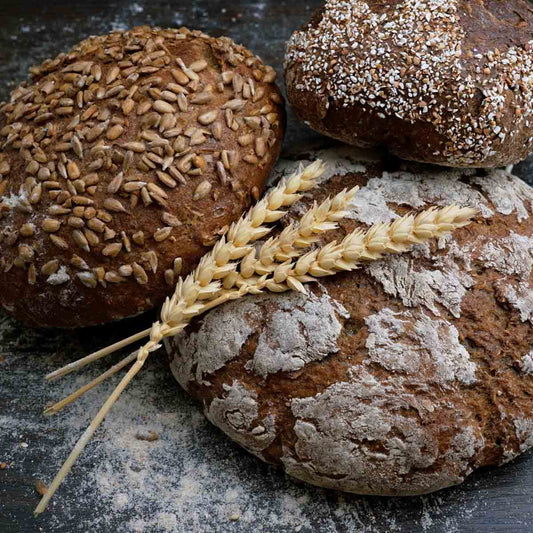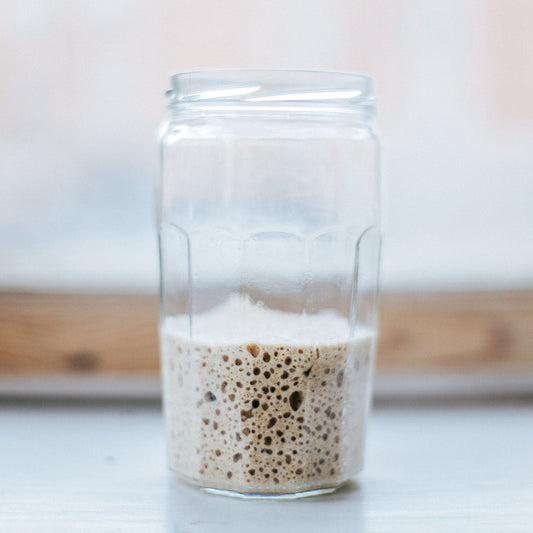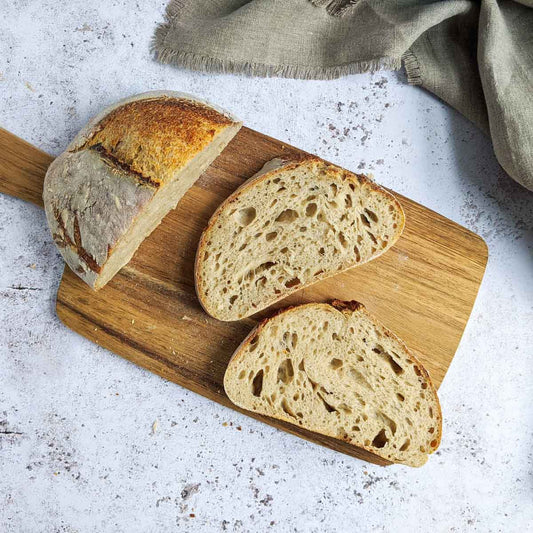Is Sourdough Bread Healthy?
What is Sourdough Bread?
To answer the article title question, it helps to take a step back and talk about what sourdough is. Sourdough isn't a flavor or type of bread; it's a process – a traditional fermentation process, to be specific. It's the original way of making bread.
Sourdough bread is made by fermenting dough with a diverse culture of naturally occurring wild yeasts and lactic acid bacteria, a process that both leavens the dough, causing it to rise, and acidifies it, creating the classic tang that gives sourdough its name. This ancient preparation method produces the very qualities in a loaf of bread that we love so much: the voluminous rise, the chewy texture, the delicious flavor, and the infamous tang. On a microscopic level, fermentation also elicits a whole host of biochemical changes that dramatically alter the nutritional profile and digestibility of grains.
Is sourdough Bread Healthy?
The answer to this question is a resounding yes, with two significant caveats. Let's start with some crucial distinctions before getting to the fun stuff.
1) Most of the "sourdough bread" in the supermarket today is not real sourdough. It's made with commercial yeast (and probably many additives) instead of a long and slow natural fermentation, so it does not confer any health benefits discussed in this article. The best way to get your hands on the good stuff is to purchase from a brand or local bakery that makes naturally leavened bread using a sourdough starter. Or make it yourself!
2) Real sourdough bread made exclusively from white flour will not be nearly as nutrient-rich as bread made with whole-grain flour. It'll still be far more nutritious and easier to digest than conventional bread (even conventional "whole grain" bread). But, compared to whole grain sourdough bread, it doesn't pack the same punch in terms of vitamins, minerals, dietary fiber, and flavor.
Back to the original question: is sourdough bread healthy? Yes, it is! Whole grain sourdough bread is a nutrient-rich, delicious, slow-digesting carbohydrate that is incredibly nourishing and easy to digest. It's an excellent source of healthy complex carbohydrates, dietary fiber, vitamins, minerals, polyphenols, antioxidants, and prebiotics. Sourdough fermentation harnesses the power of microorganisms to transform grains into their most nutritious, flavorful, and digestible form. It really is an ancient superfood.
Health Benefits of Sourdough Bread
1) It’s More Nutritious
Sourdough fermentation increases the bioavailability of nutrients in grains, like B- vitamins, iron, zinc, magnesium, potassium, and phosphorus. It also boosts the levels of amino acids, including lysine and branch chain amino acids. These important benefits occur because the fermentation process neutralizes an enzyme inhibitor called Phytic Acid. Phytic acid exists naturally in grains (and many other foods), and its job is to keep vitamins and minerals locked up and inaccessible. When consumed, it chelates minerals, meaning it binds to them and prevents our bodies from absorbing those nutrients. This is why fermentation is such an essential and amazing tool. It breaks down phytic acid and other enzyme inhibitors and unlocks the full nutritional value of grains.
2) It’s Good for Your Gut
During a long and slow fermentation, lactic acid bacteria break down long-chain starches, like fructans and other FODMAPS, and degrade complex proteins, like gluten. In doing so, they're actually predigesting the very things that humans cannot properly digest on their own. It's a unique symbiotic relationship between people and bacteria. We nurture and feed the microbial communities in a sourdough culture, and in turn, they transform flour into a highly digestible and nutrient-rich food.
3) It’s Good For Your Gut Part Two: More Prebiotic Fiber!
Prebiotic fiber is naturally occurring in whole grains, and sourdough fermentation produces more of it. Prebiotics are a type of indigestible fiber that is an important food source for beneficial gut bacteria and helps promote a healthy and diverse microbiome. In particular, lactic acid bacteria produce Beta Glucans, a well-known insoluble fiber with prebiotic properties associated with a myriad of health benefits.
3) It has a lower glycemic Index
Sourdough bread may also have a lower glycemic index than other types of bread. There are a couple of different hypotheses around this idea, and they each may contribute towards the same end.
- Fermentation results in many carbohydrates being predigested by microorganisms before we ever even take a bite, so it likely has a lower starch content than regular bread.
- The acidity from the lactic acid bacteria may also slow down the rate at which our bodies break the carbohydrates in bread.
- The fermentation process may also increase the resistant starch content and prebiotic fiber content, both of which would lead to slower glucose release and a lower GI index.
4) It Degrades Gluten Content
Now, this is the one people get really excited about. I briefly mentioned it above, but considering the prevalence of celiac disease, gluten intolerance, and general gluten avoidance, it deserves a more thorough deep dive. During fermentation, an enzyme called protease chops up gluten proteins, which actually softens the dough and increases its elasticity, improving the texture and structure of the final product. Simultaneously, lactic acid bacteria degrade gluten content through hydrolysis, which severs the peptide bonds connecting complex protein structures and converts them into more simple amino acid chains.
This is why some celiac or gluten-sensitive individuals find that they're able to consume sourdough bread without triggering any autoimmune reactions. It's also a reason why sourdough bread may be a better option for everyone and a far healthier alternative to conventional bread and other gluten-containing foods on the market today.
To Sum It All Up
Naturally fermented sourdough bread is a fundamentally different food than the conventional products sold in grocery stores today. Thanks to the extraordinary predigesting powers of fermentation, this ancient superfood is a slow-release carbohydrate rich in vitamins and minerals, polyphenols, antioxidants, dietary fiber, and prebiotics. And it's easy to digest! All you need to perform this time-honored preparation is flour, water, salt, and time. That's it. No commercial yeast, no additives, no dough conditioners, no isolated wheat gluten, no sugars or syrups. Just the good stuff.
Sources
- https://www.nature.com/articles/s41598-018-24149-w.pdf?origin=ppub#:~:text=Sourdough%20fermentation%20considerably%20increased%20the,several%20small%20peptides%20containing%20BCAAs.
- https://www.ncbi.nlm.nih.gov/pmc/articles/PMC5536075/
- https://www.ncbi.nlm.nih.gov/pmc/articles/PMC8306212/#B37-microorganisms-0901355
- https://www.ncbi.nlm.nih.gov/pmc/articles/PMC3273010/




